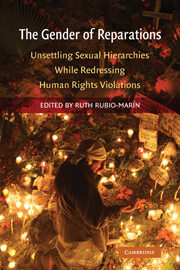Book contents
- Frontmatter
- Contents
- Acknowledgments
- Contributors
- Photo Credits: “Gender, Memorialization, and Symbolic Reparations,” in The Gender of Reparations
- International Center for Transitional Justice (ICTJ)
- Introduction: A Gender and Reparations Taxonomy
- 1 Gender and Violence in Focus: A Background for Gender Justice in Reparations
- 2 The Gender of Reparations in Transitional Societies
- 3 Reparation of Sexual and Reproductive Violence: Moving from Codification to Implementation
- 4 Reparations as a Means for Recognizing and Addressing Crimes and Grave Rights Violations against Girls and Boys during Situations of Armed Conflict and under Authoritarian and Dictatorial Regimes
- 5 Repairing Family Members: Gross Human Rights Violations and Communities of Harm
- 6 Tort Theory, Microfinance, and Gender Equality Convergent in Pecuniary Reparations
- 7 Gender, Memorialization, and Symbolic Reparations
- 8 Gender and Collective Reparations in the Aftermath of Conflict and Political Repression
- Index
- References
8 - Gender and Collective Reparations in the Aftermath of Conflict and Political Repression
Published online by Cambridge University Press: 25 August 2009
- Frontmatter
- Contents
- Acknowledgments
- Contributors
- Photo Credits: “Gender, Memorialization, and Symbolic Reparations,” in The Gender of Reparations
- International Center for Transitional Justice (ICTJ)
- Introduction: A Gender and Reparations Taxonomy
- 1 Gender and Violence in Focus: A Background for Gender Justice in Reparations
- 2 The Gender of Reparations in Transitional Societies
- 3 Reparation of Sexual and Reproductive Violence: Moving from Codification to Implementation
- 4 Reparations as a Means for Recognizing and Addressing Crimes and Grave Rights Violations against Girls and Boys during Situations of Armed Conflict and under Authoritarian and Dictatorial Regimes
- 5 Repairing Family Members: Gross Human Rights Violations and Communities of Harm
- 6 Tort Theory, Microfinance, and Gender Equality Convergent in Pecuniary Reparations
- 7 Gender, Memorialization, and Symbolic Reparations
- 8 Gender and Collective Reparations in the Aftermath of Conflict and Political Repression
- Index
- References
Summary
When the rebels attacked Kingtom, we ran into hiding but unfortunately, someone told the rebels that we were in the mosque. …They located us, killed six people, chopped off my sister's head, raped me, tied me up and amputated my foot…for four days I was there alone and maggots started coming from my foot. …Later I was rescued by some ECOMOG soldiers who took me to the hospital where I learnt I had become pregnant and had to do an abortion.
Ideas of “reconciliation” and “transitional justice” have rapidly diffused around the world in the past two decades, intended to help post-authoritarian or post-conflict societies deal with the legacy of gross human rights violations. Much of the debate to date has focused on the status and treatment of the offenders, and in particular whether they should be prosecuted for their actions or accorded some form of amnesty or forgiveness in the name of national healing and reconciliation. However, there are equally important developments regarding the status and treatment of the victims, and in particular whether they should receive some form of reparations.
Indeed, reparations for victims of gross human rights violations are becoming an increasingly common feature of transitional processes. We can see this trend in the recommendations of various truth commissions and in the emerging jurisprudence of national and international human rights adjudication bodies, and it has recently been endorsed by the UN in its UN Basic Principles and Guidelines on the Right to a Remedy and Reparation for Victims of Gross Violations of International Human Rights Law and Serious Violations of International Humanitarian Law (2005).
- Type
- Chapter
- Information
- The Gender of ReparationsUnsettling Sexual Hierarchies while Redressing Human Rights Violations, pp. 381 - 402Publisher: Cambridge University PressPrint publication year: 2009
References
- 3
- Cited by



